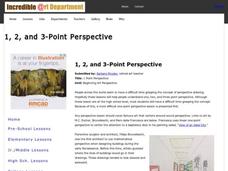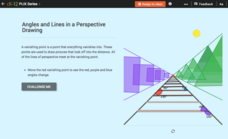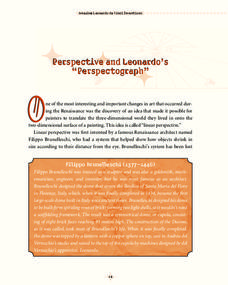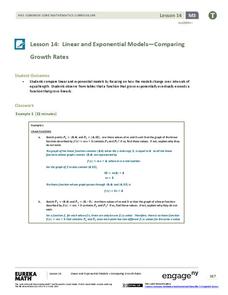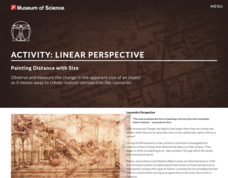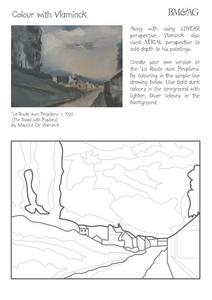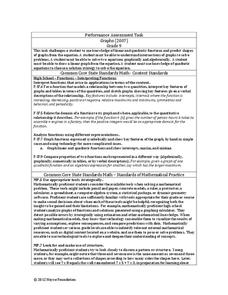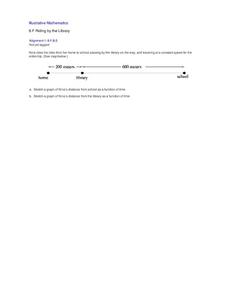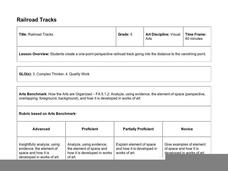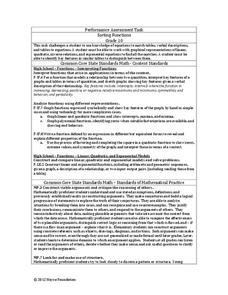Incredible Art
1, 2, and 3-Point Perspective
Introduce drawing high schoolers to perspective with a series of instructional activity that detail how to draft images in one-, two-, and three-point perspective. Each exercise includes step-by-step, illustrated directions and examples.
CK-12 Foundation
Linear Pairs: Angles and Lines in a Perspective Drawing
Gain some perspective on linear pairs. Aspiring mathematicians adjust the vanishing point on a perspective drawing. They see the effect on linear pairs of angles and answer five challenge questions based on their observations.
National Gallery of Canada
Mastering One-Point Perspective
Cover one-point perspective through observation and practice. Class members examine several works of art that use one-point perspective, look at magazine images to find the vanishing points and horizon lines, and draw their own city...
The New York Times
Perspective and Leonardo’s “Perspectograph”
Filippo Brunelleschi's invention of linear perspective during the Renaissance was further developed by his apprentice, a young artist named Leonardo da Vinci. Now modern artists can give da Vinci's famous perspectograph a try with a...
CK-12 Foundation
Families of Lines: Room in Perspective
Get a perspective of lines that share a point. The interactive displays a family of lines that share the same y-intercept. Individuals can find the equations of the lines by moving the line displayed and find what is common about all the...
EngageNY
Linear and Exponential Models—Comparing Growth Rates
Does a linear or exponential model fit the data better? Guide your class through an exploration to answer this question. Pupils create an exponential and linear model for a data set and draw conclusions, based on predictions and the...
Curated OER
Art Basics Scavenger Hunt
Hand out this worksheet and lead your class on a scavenger hunt. Pupils look for examples of shape, form, balance, pattern, perspective, space, and depth. They draw and write about the examples they've found. A great resource to add to...
Museum of Science
Linear Perspective: Painting Distance with Size
Young scholars examine a simple set up to measure the change in the apparent size of an object as it moves away from them.
Curated OER
Using Math to Draw the Mayflower
Third graders access information from a website about the Pilgrims trip on the Mayflower and discuss the number of people on the ship and the time they spent on the ship. They draw, label and measure the Mayflower to perspective.
Curated OER
Colour with Vlaminck
In this perspective activity, students view a painting by De Vlaminck. They create their own version of the painting by coloring an included line drawing. Students are challenged to use dark colors in the foreground and lighter, bluer...
Curated OER
City Streets in One-Point Perspective
Students examine the basics of drawing forms in one-point perspective, and linear perspective. They transform their drawings into city scenes using one-point perspective.
Inside Mathematics
Graphs (2007)
Challenge the class to utilize their knowledge of linear and quadratic functions to determine the intersection of the parent quadratic graph and linear proportional graphs. Using the pattern for the solutions, individuals develop a...
West Contra Costa Unified School District
Solving Inequalities
What does translating points on a number line have to do with solving inequalities? Young mathematicians first learn about translations of points on a number line, and then use this information to solve linear inequalities in one variable.
Illustrative Mathematics
Riding by the Library
Draw a graph that shows the qualitative features of a function that has been described verbally. Make sure learners understand where time is zero and the distance is zero. It may take them some time to understand this concept, so working...
Hawaiʻi State Department of Education
Railroad Tracks
Ahhh the vanishing point! Sounds ominous, but it's not. Fifth graders analyze the use of perspective in Renaissance art. They practice using linear perspective to draw railroad tracks that seem to go on forever. Tip: Make this lesson...
Museum of Science
Open Window: Using Leonardo's Perspectograph
Young scholars look through one eye and trace the outlines of objects seen through a window to create a drawing with natural and correct perspective.
Curated OER
Fantasy Buildings in Two-point Perspective
Fifth graders learn the basics of drawing forms in two-point perspective. They can then transform their drawings into a fantasy building.
Inside Mathematics
Graphs (2006)
When told to describe a line, do your pupils list its color, length, and which side is high or low? Use a worksheet that engages scholars to properly label line graphs. It then requests two applied reasoning answers.
Mathematics Assessment Project
College and Career Readiness Mathematics Test B1
Math was easier before it got mixed up with the alphabet. A 10-page test covers material from multiple years of high school math. Scholars demonstrate knowledge across domains with a mixture of short answer and applied problems.
Curated OER
Getting Perspective In The Renaissance
Students engage in a lesson that is concerned with the art of photography. They conduct research using the Internet and other resources. The students use the lesson plan to create context for using analytical language for class discussion.
EngageNY
Complex Numbers and Transformations
Your learners combine their knowledge of real and imaginary numbers and matrices in an activity containing thirty lessons, two assessments (mid-module and end module), and their corresponding rubrics. Centered on complex numbers and...
Curated OER
Dimensional Space: Various Perspectives
Students use their understanding of 3D on 2D to make a representation of a 4D form on paper.
Inside Mathematics
Squares and Circles
It's all about lines when going around. Pupils graph the relationship between the length of a side of a square and its perimeter. Class members explain the origin in context of the side length and perimeter. They compare the graph to the...
Inside Mathematics
Sorting Functions
Graph A goes with equation C, but table B. The short assessment task requires class members to match graphs with their corresponding tables, equations, and verbalized rules. Pupils then provide explanations on the process they used to...


